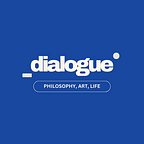Why bite-sized philosophy matters more than ever.
In the world of academia, great thinkers discuss, deliberate, and conclude ideas about the most pressing issues of our time. However, these great ideas tend to stay in their own bubbles, both physically and metaphorically.
When was the last time we read an academic journal bar that for what is required for our own academics? This question is rhetorical and demands not answers, but introspection.
And I ask this question not to demean or shame, because the inaccessibility of big and important ideas is not our fault. We, the average person, have both a moral responsibility to seek out knowledge; the fact that knowledge is gatekept and firewalled by financial incentives, is not our doing. Not only that, the overarching issue is, and always has been, the way academia is structured.
We are told the rules of rhetoric and engagement when we enter post-secondary, but these are met with scoffs and disengagement. Again, this is not our fault. A set of rules that dictate how information is presented is a form of organization, not presentation. The metric that we learn to follow in preparing various dockets of information are meant for those of higher knowledge to evaluate, so it makes only sense to follow a rule that shows excellence.
Except it doesn’t really. Neither academics nor students benefit from the hard-lined rules we follow. In fact, studies have asserted that the greatest demonstration of knowledge comes from being able to simplify ideas to the level of juvenile comprehension. Yet despite academics showing that academic jargon isn’t contributing enough to increase knowledge, academics go forward with the status quo.
But none of that matters without a look back into us, the common man.
Let’s examine philosophy, a subject viewed as highly academic and highly disconnected to the average person. But how? How is it that the study of what concerns us all is so inaccessible? As I argue that philosophy is present in everything we do, whether we label it as such or not, we can come to a solution as the Ancient Greeks did several millenia ago.
Enter, the Delphic Maxims.
At the Temple of Apollo in Delphi, Greece, were inscribed nearly 150 short-form moral prescriptions. And I call them that because that is essentially what they were; medicine — digestible solutions to most of life’s dilemmas.
The most popular amongst them: “Know thyself”.
Short, understandable and accessible.
These three qualities of the maxim showed the Greek mindset regarding philosophy. As some of the greatest pioneers of modern philosophical thought, they knew that the importance of philosophy would go to waste if it stayed in the luxurious circles of wealthy aristocrats. Inscribing maxims on a temple was their way of sharing knowledge for social access, and ultimately, social cohesion towards enduring Ancient Greek morals.
Ultimately, this all means one thing. As knowledge-seekers, we should push for knowledge to be accessible to all. We need to value learning and education as the moving force of our time, the element that differentiates the past from the future. And if we are ever to imagine a world with progress, we need to help others be a part of it too.
This is where Dialogue comes in. I hope for this blog to be accessible, readable, and understandable, so that every so often, we learn that from which we change. In doing so, I hope that we love to learn, and to share what we learn with one another.
As one Delphic Maxim read, I hope to “never tire of learning”.
Links used below:
